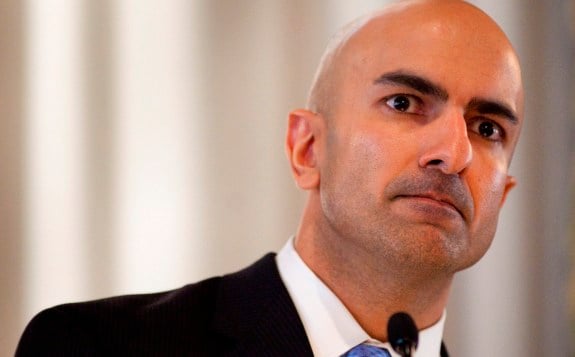Buys long/short fund, then persuades SEC to allow conversion; acquires portfolio manager in the process
Pacific Investment Management Co. LLC took another step toward expanding its equity mutual fund lineup on Thursday with the introduction of its first long/short fund. The number of long/short mutual funds has jumped over recent years, with 17 new funds launched in 2011 alone. The bond giant, however, took an unusual path to launch the Pimco Eqs Long/Short Fund Ticker:(PMHAX).
Rather than simply hire a portfolio manager with experience running a long/short hedge fund, Pimco went out and acquired that sort of hedge fund from Catamount Capital Management, along with its manager, Geoffrey Johnson. It then persuaded the Securities and Exchange Commission to allow it to convert the hedge fund into a 1940 Act mutual fund.
“We went through a lot of back and forth with the SEC to show that the hedge fund, by chance, already met all the requirements for a '40 Act fund,” said Neel Kashkari, head of global equities at Pimco. Specifically, the hedge fund wasn't using any leverage or strategies that are restricted in traditional mutual funds.
By converting the hedge fund into a mutual fund, rather than starting a new fund from scratch, Pimco is able to market the fund's past performance, which will give it an advantage with clients who are taking a wait-and-see approach when it comes to Pimco's equity capabilities.
“We hear from a lot of clients that they're interested [in Pimco equity funds] but they want to watch as we develop track records,” Mr. Kashkari said. Pimco's push into equities began in earnest around two years ago, with the launch of the Pimco Eqs Pathfinder Fund Ticker:(PATHX). The long/short fund is the firm's fourth equity fund. So far, the firm has attracted approximately $5.6 billion in assets into its equity lineup.
Mr. Johnson's strong track record — his five-year annualized returns of 6.7% rank in the top fifth percentile of long/short equity funds, according to Morningstar Inc. — should help quell any concerns over the newness of the fund, Mr. Kashkari said.
Pimco can also point to Mr. Johnson's ability to protect on the downside, which is a key focus for Pimco's equity funds. In 2008, his hedge fund only lost 5%, while the average long/short equity fund was down 15%. The S&P 500 fell 37%.
It wasn't the fund's ability to short that kept it largely out of trouble in 2008, Mr. Johnson said. "It was its ability to go to cash," he noted. The fund peaked at 95% cash as the markets were tumbling. “With cash, you know what your losses are going to be: zero,” he said. “With shorts, you don't know what your losses will be.”
Mr. Johnson is focused on finding companies he thinks will benefit from the “new normal,” the buzzword Pimco coined to describe the slow-crawling economy. The fund has traditionally had a North American bias, because of the realities of Mr. Johnson's research capabilities. Now that he is with Pimco, however, he expects to be able to leverage their research to be more global.







